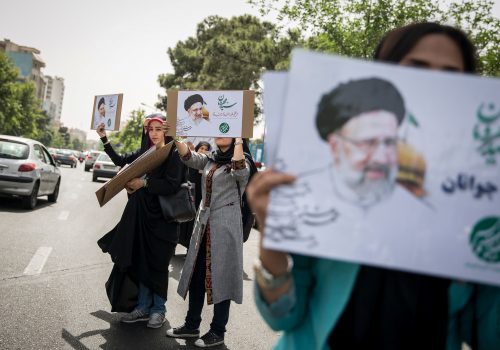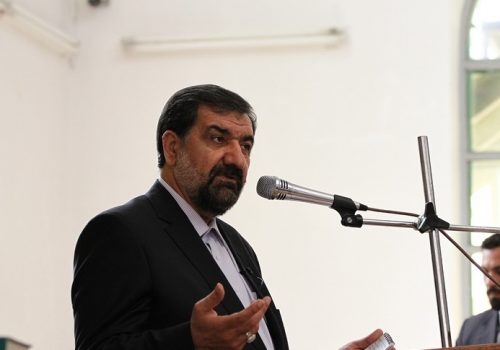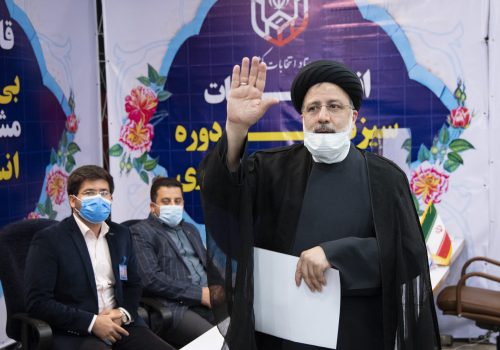Khamenei is dropping Iran’s democratic façade
Just five years ago, Supreme Leader Ayatollah Ali Khamenei exhorted Iranians to turn up at the polls, even calling on those citizens who despised him to vote for the sake of Iran.
“Everyone should participate in the elections,” he said ahead of the 2016 parliament and assembly of experts elections. “Even those who do not accept the ruling system should participate for the sake of the country.”
But his pleas for turnout ahead of the looming June presidential vote have become decidedly less vocal and enthusiastic. After last year’s parliamentary election debacle, in which there was a record-low official turnout of 42 percent—the lowest since the 1979 revolution—Khamenei likely doesn’t want to put his credibility on the line by allowing it to appear that Iranians are simply ignoring him. A paltry 43 percent of the public has said that they would participate in the upcoming vote, according to a poll conducted by the state-owned Iranian Students Polling Agency.
The decision of the Guardian Council, a vetting body, to exclude moderate or reformist heavyweights, such as former parliamentary speaker Ali Larijani or Mostafa Tajzadeh, from running also suggests a regime elite taking a different view of elections.
“There is certainly some degree of nervousness among the establishment,” said Ali Fathollah-Nejadi, an Iran watcher at the Afro-Middle East Centre and author of Iran in an Emerging New World Order. “It may be an odd mix between a sense of hubris, given their domestic opponents’ historical weakness, and the fear that Ali Larijani’s late blitz media entry into the race could have enabled a popular mobilization.”
Khamenei for years has been agitating to find what he describes as a new generation of young and pious “revolutionaries”—that is, hardline supporters of Islamic theocracy—to take the helm of the country’s institutions. That aim—more than acceding to the Iranian people’s preferences and boosting the popular legitimacy of the system—may be taking priority.
At eighty-two, the Supreme Leader appears to have found a successor in Ebrahim Raisi, the sixty-year-old judiciary chief who lost badly to President Hassan Rouhani in 2017, but who remains a favorite of the hardline camp loyal to Khamenei. Hardline news outlets have aggressively highlighted his presence in the race, even comically enlarging his photo in front-page montages of candidates.
It’s also very likely that he and the rest of the regime’s elders have decided that, in an era when autocrats worldwide blithely use trickery to manipulate elections and outcomes to achieve victory, the trappings of electoral democracy do not mean so much anymore. That could have profound implications for the future of the Islamic Republic.
Twelve years ago, accusations of a rigged election victory for hardline incumbent President Mahmoud Ahmadinejad prompted hundreds of thousands of Iranians to take to the streets. Supported by factions within the ruling establishment as well as the sons and daughters of regime stalwarts, the mass protests amounted to the biggest challenge to the Islamic Republic since it was founded in 1979. They were violently suppressed, with dozens killed and at least four thousand arrested. Opposition leaders Mir Hossein Mousavi, Zahra Rahnavard, and Mehdi Karroubi were under house arrest until this day.
It is worth recounting what exactly transpired on that day on June 12, 2009. Irregularities began early on election day, when authorities blocked text messaging services, effectively thwarting the campaign of Mousavi’s system for ensuring transparency at the polls. As election day drew to a close, authorities began raiding the offices of opposition parties and arresting prominent reformist politicians and activists.
Hours before the polls closed, state television accidentally posted the results, then quickly retracted what would later match the official count. Ballots were seized by security forces, counted in locations inaccessible to opponents of Ahmadinejad. High turnout in the 1997 and 2001 elections benefited the reformist candidate, a dynamic borne out in the 2013 and 2017 elections, leading to the moderate Rouhani’s first-round wins. To those on the ground watching, the vote was clearly forged.
The election debacle caused a rift between the regime and the voters that became partially healed after Rouhani won the 2013 election on the strength of youth, women, and minority voters hoping to send a message to the regime by propelling the moderate pragmatist to an improbable first-round victory with just over 50 percent of the popular vote.
But, this year, the establishment appears to be taking little chances. In the last week of May, the Guardian Council rejected all the major reformist candidates applying to run, including former Interior Minister Mostafa Tajzadeh and Rouhani’s First Vice President, Eshaq Jahangiri, allowing former President Mohammad Khatami’s relatively obscure vice-president Mohsen Mehralizadeh to be the only reformist candidate.
The Guardian Council approved five candidates from the conservative camp and a technocrat, Central Bank governor Abdolnaser Hemmati. Typically, Iranian presidential candidates muster up support from their narrow regional or ideological base before dropping out at the last minute and endorsing the front-runner in their camp. However, this time, there appears to be no space for such a mobilization of voters naturally supportive of reformists.
If turnout remains small and people abide by a boycott call spearheaded by Iranian exiles and activists inside Iran, hardliners will benefit.
“They have no more concern about the candidates,” explained an Iran-based journalist. “They might be a little bit worried about the voter turnout. But that’s not a big problem for those who only think about taking office. Once they become the ‘elected’ president, they will have control over all branches of power and, in that case, it doesn’t matter how many have voted for them.”
If there is a surprising groundswell of support for the reformists, Khamenei can always take a page out of the book of dictators like Belarus’ Alexander Lukashenko and Syria’s Bashar al-Assad and just adjust the vote results or turnout figures to his liking.
“They can create any numbers,” said one journalist in Tehran. “They figured out the way. They know how to fool people…They use archival footage to give the impression of high turnout. They’re using various methods to draw people to the polls.”
The 2009 elections were preceded by weeks of televised debates, lively political discussions, and street rallies that excited voters. It’s doubtful that a forged election would result in another 2009-style uprising—and Khamenei seems to know it.
“All elections held by the Islamic Republic have been totally flawless,” Khamenei said on May 2. “There might have been certain issues and offenses, but none of them had a significant impact on the result of elections. Those who raise fraud claims do so because of being defeated.”
Khamenei for years used to say and seemed to truly believe that any election was equal to a referendum on the regime. In 2009, he insisted that all forty million votes cast amounted to support for the Islamic regime.
Nevertheless, with a volatile and angry public that has risen up several times over the last dozen years—most recently in November 2019—the crevice between the Iranian public and the establishment appears to have widened. The increasingly brazen interventions for and against candidates by the Guardian Council Khamenei directly and indirectly appoints carries risks. In addition to calls to stay from the polls by those at home and abroad, there are already unprecedented boycott calls by leading figures within Iran, including Tajzadeh and even Ahmadinejad, who tried for the second time in two elections to run but was rejected.
But Khamenei might no longer care. His embrace of the increasingly unfree nature of the authoritarian-democratic model of elections suggests that the Supreme Leader’s views may have evolved, seriously damaging and further constraining the popular legitimacy of the Islamic Republic.
Borzou Daragahi is an international correspondent for The Independent. He has covered the Middle East and North Africa since 2002. He is also a nonresident fellow with the Atlantic Council’s Middle East Security Initiative. Follow him on Twitter: @borzou.
Image: Iran's Supreme Leader Ayatollah Ali Khamenei delivers a speech during a virtual meeting in Tehran, Iran May 27, 2021. Official Khamenei Website/Handout via REUTERS


